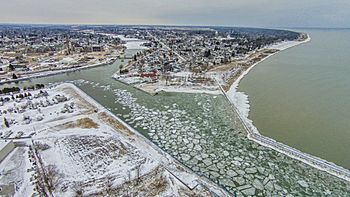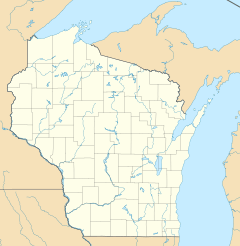West Twin River (Wisconsin) facts for kids
Quick facts for kids West Twin River |
|
|---|---|

East Twin and West Twin rivers meet at the Two Rivers harbor before journeying into Lake Michigan.
|
|
| Country | United States |
| State | Wisconsin |
| Physical characteristics | |
| Main source | Conjunction of the Devils River and the Neshota River 44°17′51″N 87°46′18″W / 44.2974944°N 87.7717564°W |
| River mouth | Confluence with the East Twin River at Two Rivers, Wisconsin 581 feet (177 m) 44°08′42″N 87°33′45″W / 44.1449957°N 87.5625810°W |
| Length | 18.5 miles (29.8 km) |
| Basin features | |
| Progression | South-southeast and east |
| River system | West Twin River |
| Basin size | 176 square miles (460 km2) |
The West Twin River is a river in east-central Wisconsin. It is about 18.5 miles (29.8 km) long. This river flows into Lake Michigan. It used to be called the Neshota River.
The West Twin River joins with the East Twin River. They meet in a city called Two Rivers, Wisconsin. This meeting point is very close to Lake Michigan.
The West Twin River starts in Brown County, Wisconsin. It begins near the Richard J. Drum Memorial Forest. It is formed when two other rivers, the Devils River and the Neshota River, come together. As it flows, it goes past small places like Kingsbridge and Shoto.
Shoto Dam and Shoto Lake
About 6 miles (9.7 km) from where it ends, the West Twin River runs into the Shoto Dam. This dam splits the river into two main parts. The part of the river below the dam is wide, shallow, and moves slowly. The water quality there is not as good.
Above the dam, the river is narrow, deep, and flows much faster. The water quality in this upper part is very good. The Shoto Dam also creates a large lake. This lake is called Shoto Lake and covers about 55 acres (22 hectares).
Rivers and Creeks that Join the West Twin River
Many smaller rivers and creeks flow into the West Twin River. These are called its tributaries. They add water to the main river as it travels.
Here are some of the main ones:
- Black (Buck) Creek
- Devils River
- Francis Creek
- King Creek
- Kriwanek Creek
- Neshota River
- Twin Hill Creek
 | Bayard Rustin |
 | Jeannette Carter |
 | Jeremiah A. Brown |



